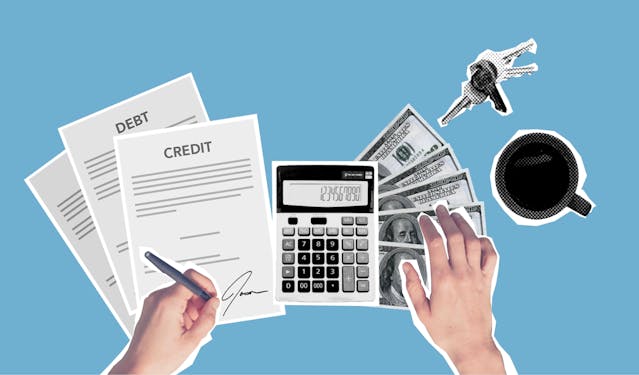But what exactly is credit, and how is it measured? In this article, we’ll dive into the world of credit scores and explain what they mean, how they are calculated, and how you can improve your credit score. Understanding the intricacies of credit scores can help you make more informed financial decisions and potentially save money in the long run.
What Is Credit?
Credit is a measure of a person’s ability to borrow money and pay it back. It is represented by a numerical value known as a credit score. Credit scores are used by lenders, landlords, and employers to evaluate a person’s creditworthiness. They are essentially a financial report card that gives others a quick snapshot of your financial reliability.
Having credit is like being given a vote of confidence that you will fulfill your financial obligations. Whether you’re applying for a mortgage, a personal loan, or trying to lease a vehicle, your credit score will be a critical factor in the process.
How Is a Credit Score Calculated?
Your credit score is calculated based on information from your credit report. This includes your payment history, amounts owed, length of credit history, new credit, and types of credit used. Each of these factors contributes to your overall score and reflects different aspects of your financial behavior.
The most commonly used credit score is the FICO score, which ranges from 300 to 850. The higher your score, the better your credit. FICO scores are calculated using the following factors:
- Payment History (35%)
- Amounts Owed (30%)
- Length of Credit History (15%)
- New Credit (10%)
- Types of Credit Used (10%)
These percentages show the weight of each factor in determining your credit score. For instance, regularly paying your bills on time is the best way to maintain a good score, as it makes up the largest portion of the calculation. Conversely, high balances relative to your credit limits can significantly lower your score.
Why Is Your Credit Score Important?
Your credit score is an important indicator of your financial responsibility and can have a significant impact on your life. Here are a few reasons why your credit score is important:
Getting Approved for Loans and Credit Cards
Lenders use your credit score to determine whether to approve your loan application and at what interest rate. A higher credit score means you are less of a risk to lenders, and you are more likely to get approved for a loan or credit card. Essentially, a good credit score can be the difference between getting the financial support you need and being denied.
Lower Interest Rates
A high credit score can also lead to lower interest rates. This means you will pay less money in interest over time, saving you thousands of dollars in the long run. For big-ticket items like homes and cars, even a small difference in interest rates can lead to substantial savings.
Renting an Apartment or House
Landlords often run credit checks on potential tenants to assess their financial stability and responsibility. A low credit score can make it harder to rent an apartment or house, or it may require a larger security deposit. In competitive rental markets, a good credit score can give you a significant edge.
Getting a Job
Some employers may request a credit report as part of their hiring process. A poor credit score can be a red flag for employers, as it may indicate financial irresponsibility. Certain positions, particularly those in finance or management, may place a higher emphasis on a candidate’s credit history.
How to Check Your Credit Score
Now that you understand the importance of your credit score, you may be wondering how to check it. The good news is, you can easily access your credit score for free.
AnnualCreditReport.com
By law, you are entitled to one free credit report from each of the three major credit bureaus (Equifax, Experian, and TransUnion) every 12 months. You can request your free credit report from AnnualCreditReport.com. It’s a good practice to stagger these reports, requesting one from a different bureau every four months to keep a regular check on your credit.
Credit Card Companies
Many credit card companies offer free credit scores to their customers. Check with your credit card issuer to see if they provide this service. These scores are often updated monthly and can be a convenient way to stay informed about your credit status.
Credit Score Websites
There are also numerous websites that offer free credit scores, such as Credit Karma, Credit Sesame, and NerdWallet. However, keep in mind that these scores may not be the same as the ones used by lenders. They can still be useful for monitoring changes and trends in your credit score over time.

How to Improve Your Credit Score
If you have a low credit score, don’t worry. There are steps you can take to improve it.
Pay Your Bills on Time
Payment history accounts for 35% of your credit score, making it the most important factor. Make sure to pay all your bills on time, including credit card payments, student loans, and any other debt you may have. Setting up automatic payments or calendar reminders can help ensure you never miss a due date.
Keep Your Credit Utilization Low
Credit utilization refers to the amount of credit you are using compared to your credit limit. A high credit utilization ratio can negatively impact your credit score. Try to keep your credit utilization below 30% to improve your score. If you’re consistently reaching your credit limit, consider requesting an increase or paying down balances more frequently.
Don’t Close Old Credit Accounts
Length of credit history makes up 15% of your credit score. Closing old credit accounts can shorten your credit history and lower your score. Keep your oldest credit accounts open and use them occasionally to keep them active. This demonstrates a longer, more stable credit history to potential lenders.
Monitor Your Credit Report for Errors
Mistakes can happen on your credit report, and these errors can negatively impact your credit score. Regularly monitor your credit report for inaccuracies and dispute any errors you find with the credit bureaus. This can be done online and often results in a quick correction.
Don’t Open Too Many New Credit Accounts
New credit accounts for 10% of your credit score. Opening too many new credit accounts within a short period can lower your score. Be cautious about opening new credit accounts, and only apply for credit when necessary. Each new application can result in a hard inquiry, which can slightly reduce your score.
Diversify Your Credit
Having a mix of different types of credit, such as credit cards, auto loans, and student loans, can positively impact your credit score. It shows lenders that you are responsible with different types of credit. However, this doesn’t mean you should take on debt unnecessarily; it’s more about managing different types of credit wisely over time.
Conclusion
Your credit score is a crucial aspect of your financial health. It not only determines your ability to get a loan or credit card but can also affect your ability to rent an apartment or get a job. By understanding your credit score and taking steps to improve it, you can set yourself up for financial success. Remember to pay your bills on time, keep your credit utilization low, and monitor your credit report for errors. By following these tips, you can improve your credit score and achieve your financial goals. With diligence and patience, a better credit score—and the benefits that come with it—is within reach.





























